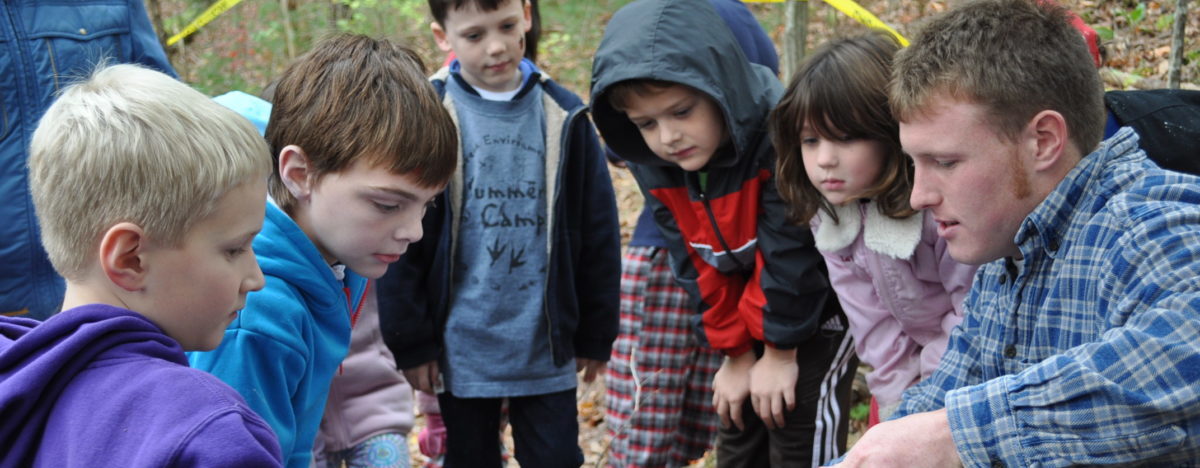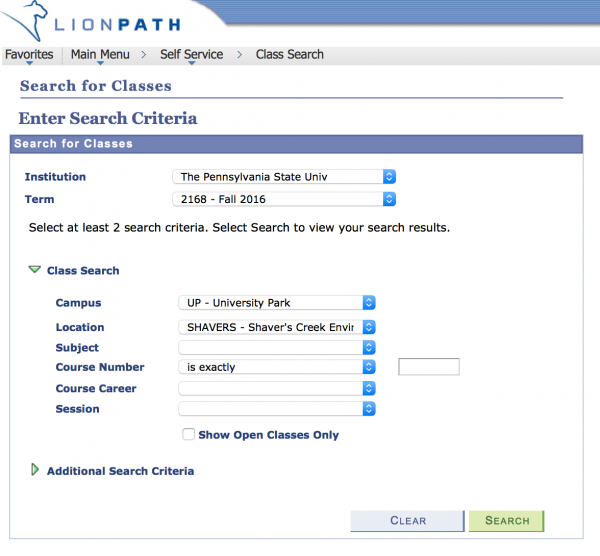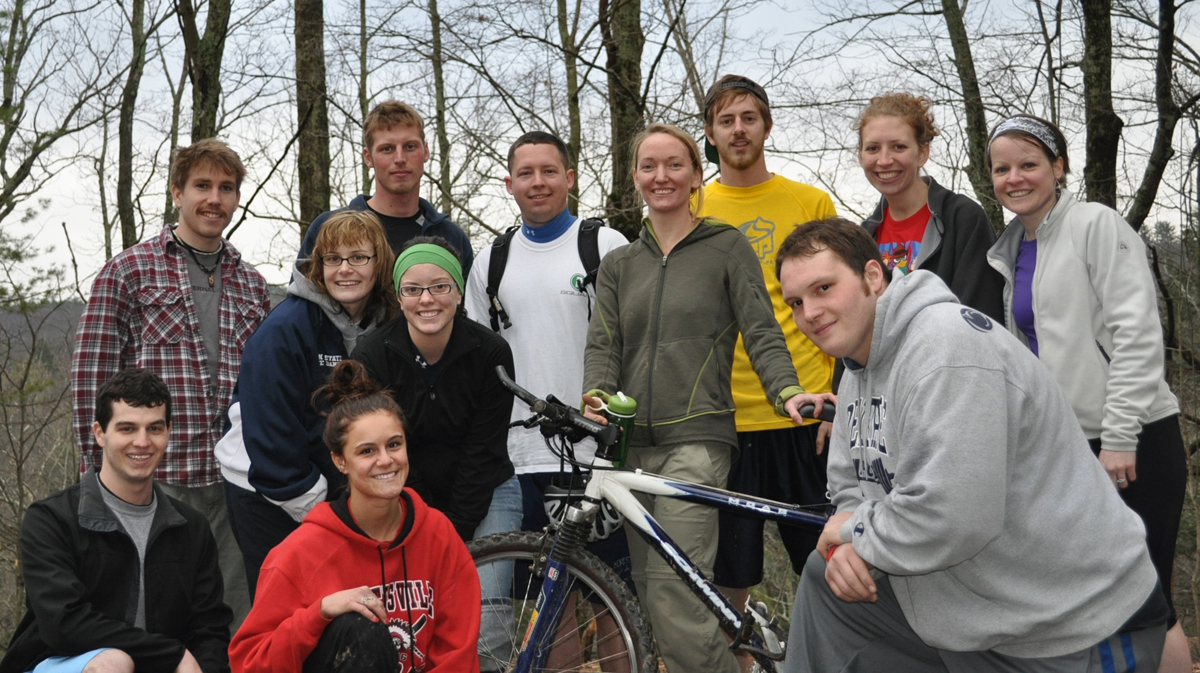
Shaver’s Creek partners with many academic colleges across Penn State to offer courses in environmental interpretation, outdoor/adventure education, and leadership. Every spring, students interested in these subjects can also participate in the Shaver’s Creek SEED Semester, an experiential journey for students.
Shaver’s Creek’s undergraduate programs are listed with many departments around the University, including Recreation, Park, and Tourism Management (RPTM), Ecosystem Science and Management (ESM), Science Education (SciEd), and more! Some of our courses also count toward the Intercollege Minor in Sustainability Leadership. While some of our classes meet on campus, many are held at the Center.
To see a list of all Shaver’s Creek classes, visit LionPath’s Search for Classes menu. Select “University Park” as the Campus and “SHAVERS” as the Location. Shaver’s Creek classes will also show up if the Location field is blank (but they will NOT appear if the Location field is set to “UNIVPARK”).

Please note: Some courses have registration controls and may require acceptance by the instructor. If you do not find a course listed in the schedule of courses, please contact us at 814-863-2000.
Festival Course
Many of Shaver’s Creek’s public programs and festivals are designed to offer Penn State students a hands-on, for-credit experience interpreting natural and/or cultural history topics to families. Our festival course dovetails with a major festival that Shaver’s Creek hosts every year — the Maple Harvest Festival — and allows students to apply their course learning directly to a real-world event that reaches thousands of adults and children.
AEE 297 — Interpreting Maple Sugaring to Families
2 credits; offered spring semester
Learn the process of maple sugaring and how to interpret this natural history process to the general public through an interactive, community-based festival — the Maple Harvest Festival (in late March).
This experiential course will explore how to identify and tap sugar maple trees, historical and modern methods of boiling sap into maple syrup, and interpretive methods for teaching the general public the art of maple sugaring at the Maple Harvest Festival in late March.
Learn more about this year’s course
To register, contact Laurie McLaughlin at loon@psu.edu or 814-865-4158.
Park Management & Environmental Interpretation Courses
SCIED 118 — Field Natural History for Teachers
3 credits; offered fall semester
The purpose of this course is to equip students with knowledge of central Pennsylvania flora and fauna, familiarize students with different techniques for teaching about natural history, and to engage students with citizen science efforts.
RPTM 140/SCIED 140 — Outdoor School Field Experience (Outdoor School Counselor)
2 credits; offered spring and fall semesters; satisfies Gen Ed GHW
This course provides students with educational leadership and teaching opportunities working with children in an outdoor residential camp setting. Students will have numerous opportunities to practice and refine their leadership skills through active participation in outdoor/environmental education. Students are provided with the opportunity to explore personal values related to the natural environment, sustainable practices, health and wellness, and technology, and to role model those values to the residential campers. Skills and competencies gained in RPTM 140 such as leadership, risk management, behavior management, developing sustainable practices, self-efficacy, and self-care transfer to other professional settings. Students will attend one full day and two evening training sessions and will also complete out-of-class assignments to prepare for Outdoor School (ODS). During the field-based experience, students live in a cabin with campers; manage participants at meals and in lessons; assist in learning groups by leading activities; and teach a cultural history lesson using first-person interpretation or activities within an adaptations lesson using live animals from Shaver’s Creek.
Consult with your adviser about how this course might count toward the Intercollege Minor in Sustainability Leadership, communications credits in WFS, and specific concentrations in CED or ERM.
SUST 200 — Foundations of Leadership in Sustainability
3 credits; offered spring and fall semesters
The goal of this course is to provide students with a foundation in sustainability literacy and responsibility that will facilitate their development as global citizens and sustainability leaders in their respective fields and personal lives.
FOR 203 — Field Dendrology
3 credits; offered fall semester
Field identification of native and introduced trees and shrubs by leaf, fruit, twig, and bark.
RPTM 240 — Instruction and Leadership in Environmental Education (Outdoor School Learning Group Leader)
2 credits; offered spring and fall semesters
Outdoor School is an environmental education experience for undergraduate students, fifth-grade children, and their teachers. This course gives students experience with leadership and mentoring of their peers participating as Outdoor School Counselors in RPTM/SCIED 140. Building on experiences gained in the pre-requisite, RPTM/SCIED 140, students will develop their environmental education skills by teaching upper-elementary schoolchildren in a residential outdoor education program. In addition, students will further develop knowledge and experience in natural history interpretation by creating and implementing lesson plans as well as teaching with live animals. Prerequisite: RPTM/SCIED 140
FOR 303 — Herbaceous Forest Plants Identification and Ecology
3 credits; offered spring semester
This course surveys common herbaceous plant taxa occurring within forested habitats in Pennsylvania and the region. Botanical characteristics, ecological interrelations, commercial importance, and field specimen collection methods are covered. Prerequisite: 3 credits in plant or biological sciences.
RPTM 325 — Principles of Environmental Interpretation
3 credits; offered fall semester. This is a prerequisite for the SEED Semester.
Forge a connection between the interests of an audience and the meaning inherent in our natural resources. Use interpretive techniques and short presentations in environmental outreach programs. This course counts toward the Intercollege Minor in Sustainability Leadership.
RPTM 326 — Natural History Interpretation
3 credits; offered spring semester. Limited to SEED Semester students only.
Learn the basics of identifying birds, trees, wildflowers, and more. Learn to read the natural landscape and tell the story of the ecology of the Eastern Forest.
FOR 403 — Invasive Forest Plants: Identification, Ecology, and Management
3 credits; offered fall semester
Survey of common nonnative (“exotic”) herbs, forbs, shrubs, trees, and vines that invade forested habitats in Pennsylvania and the region. Field identification, life history traits, ecosystem-related challenges and problems, and management options and considerations are reviewed. Prerequisite: six credits in plant or biological sciences.
FOR 418 — Agroforestry: Science, Design, and Practice
3 credits; offered spring semester of even years
Agroforestry is the intentional design of land use systems that combine tree crops with plants and/or animals in a manner that seeks to promote ecological and economic benefits within the landscape. Two possible arrangements for such systems are (1) the integration of trees within non-forested settings and/or (2) the introduction of high value ‘crop’ species into existing forestlands. The objective of the course is to foster a practical working knowledge of agroforestry as it is experienced both in Pennsylvania and throughout the world, so that students from a variety of backgrounds can integrate agroforestry practices and thinking into their own disciplines, interests, and lives.
RPTM 425 — Principles of Interpretive Materials
3 credits; offered spring semester. Limited to SEED Semester students only.
Learn principles, practices, and application of nonpersonal interpretive activities common to natural/cultural history, including exhibits, audiovisual, and illustrative materials. Prerequisite: RPTM 325
RPTM 430 — Environmental Education Method and Materials
3 credits; offered spring semester. Limited to SEED Semester students only.
Discover methods and materials for developing, implementing, and evaluating environmental education programs in formal and informal educational settings. This course counts toward the Intercollege Minor in Sustainability Leadership.
RPTM 470 — Recreation and Park Management
3 credits; offered spring semester. Limited to SEED Semester students only.
Understand management and administration procedures essential to park facilities and recreation programs.
EMSC 497 — Watershed Sensing and Imaging
3 credits; offered spring semester
Learn how to collect groundwater and stream water quality samples and soil gases. Build your own sensor and work with commercial research-grade sensors. Learn how to examine data.
Outdoor & Experiential Leadership Courses

The Shaver’s Creek Field Laboratory is Penn State’s home for courses in outdoor group management techniques, adventure leadership, and team-building skills. Shaver’s Creek faculty bring to these exciting and challenging classes their extensive experience in the fields of outdoor education and adventure recreation.
Shaver’s Creek is also home to AURORA, which includes five of the nation’s premier first-year student orientation programs.
PSU 14 — First Year Seminar
1 credit; offered fall semester
This first-year experience course is intended to introduce first-year students to the academic and social culture of Penn State. The objective is to help them engage with academic, social, and personal resources available at Penn State and in the community and to facilitate their transition to college life — giving them the best possible start to their college careers.
KINES 089 — Student Wilderness Experience (ORION, POLARIS, URSA, VEGA, SIRIUS, RIGEL)
3 credits
KINES 089 provides incoming first-year Penn State (UP) students with the opportunity to engage in a fun, challenging outdoor experience prior to their first fall at college. Incoming students meet and make new friends, learn outdoor skills that focus on the “Leave No Trace” philosophy, and set goals for their first year at Penn State while enjoying five days of backpacking adventure in one of our scenic locations nationwide. (Visit the AURORA program page for more information.)
RPTM 230 — Teambuilding Facilitation
3 credits; offered spring and fall semesters
Through hands-on experience, discussion, and observation, students will develop a sound background to the basics of teambuilding. This course will focus on the philosophy of team activities and experiential education, and the skills required to lead and facilitate teambuilding events. In addition to learning skills, the students will be asked to apply their knowledge of teambuilding to lead actual activities for their peers. Finally, students will be exposed to information about career opportunities in the field of teambuilding and adventure education. Main topics include an introduction to teambuilding philosophy and its relation to the outdoor education field. General concepts to be covered include challenge by choice, full value contracts, and the experiential learning cycle. Activity understanding to include icebreakers, problem solving activities and trust events; programming and activity sequencing; leadership skills and the role of the facilitator; stages of group development; debriefing activities, transfer of learning and metaphoric transfer; activity safety: emotional and physical; risk management and the elements of good judgment; group assessment and program creation; and program evaluation. This leadership course is encouraged for anyone in the RPTM major and open to other majors as well.
RPTM 236 — Leadership and Group Dynamics in Recreation Settings
3 credits; offered spring and fall semesters
In this course, students will be given a variety of leadership opportunities, both in and out of class, to begin to develop leadership skills as well as observe others in recreation leadership positions. Information on leadership theory and group dynamics (group development, roles in groups, group decision making) will be provided through group exercises and hands-on experiences.
RPTM 330 — Adventure-Based Program Leadership
3 credits; offered spring semester
Both theoretical and experiential components are included as the role of the leader in adventure programs is examined. This course will focus on the philosophy, leadership techniques, ethics, and current practices in the area of adventure programming. Focus of instruction will be upon program design, developing skills for facilitating personal growth, and providing leadership for outdoor pursuits.
RPTM 280 — Wilderness First Aid (“Woofa”) Certification
1 credit
The Wilderness First Aid (WFA) course focuses on the skills of response to, and assessment and treatment of, injuries while in the backcountry. Topics covered include musculoskeletal injuries, soft tissue injuries, environmental and medical emergencies, and more. Students learn practical skills that can be applied in real-life scenarios. Focus is placed on being resourceful and creative with limited supplies. This course is an intensive 2-day experience, taught both indoors and out regardless of weather, that requires engagement in experiential and practical elements. Upon completion of this course, students will obtain a 2-year Wilderness First Aid certification from SOLO Wilderness Medicine Schools, as well as a 2-year CPR certification from a major national provider. For more information, please reach out to Drew Lehnerd (dlehnerd@psu.edu).
RPTM 498 — Wilderness First Responder (“Woofer”) Certification
3 credits
The Wilderness First Responder (WFR) course focuses on the skills of response to, and assessment and treatment of, injuries while in the backcountry. WFR also delves into the ideas of long-term care, wound management, and evacuation coordination. Topics covered include musculoskeletal injuries, soft tissue injuries, environmental and medical emergencies, and much more. Students learn practical skills that can be applied in real-life scenarios. Focus is placed on being resourceful and creative with limited supplies. Compared to the WFA course (RPTM 280) WFR covers treatment of many more injuries and illnesses, examines techniques and patient management strategies in more depth, and has much more time to practice the learned skills. This course is an intensive 9-day experience, taught both indoors and out regardless of weather, that requires engagement in experiential and practical elements. Upon completion of this course, students will obtain a 3-year Wilderness First Responder certification from SOLO Wilderness Medicine Schools, as well as a 2-year CPR certification from a major national provider. For more information, please reach out to Drew Lehnerd (dlehnerd@psu.edu).
More Shaver’s Creek in the Classroom
BISC 3 — Environmental Science
3 credits; offered spring and fall semesters
We are living in extraordinary times. Our numbers have now become so large, our power so great, and our consumption so rampant that we are despoiling our home. Indeed, over the past half-century environmental scientists have been calling attention to the deterioration of Earth’s atmosphere, Earth’s oceans, Earth’s forests and Earth’s soils, along with the loss of Earth’s biodiversity, from the tropics to the poles. The evidence is unequivocal: Planet Earth is under duress.
Though we need Earth for our survival, Earth does not need us! So, will Earth shake us into oblivion or will we wake up, before it is too late, and become respectful members of Earth’s community of life? This is a critical question for humankind as a whole; and it is the reason that BISC 3 exists at Penn State. So it is that, in this course, we will explore the root causes of today’s environmental crisis and, in so doing, consider scientific, technological, sociological, psychological and personal responses to what is, arguable, the most significant crisis in the history of our species.
If you commit to fully engaging with this course, you can expect to: 1-Discover how questions can be powerful catalysts for learning; 2-Grow in your ability to see both yourself and Planet Earth from new and liberating perspectives; 3-Appreciate the power of critical thinking and personal reflection as a means to both personal and global transformation 4-Realize that you —should you choose — can play a significant role in the healing of our world.
BIOL 400 — Teaching in Biology
3 credits; offered spring and fall semesters
Teaching Assistant course for BISC 3. This course will train biology teaching assistants to teach in the laboratory/recitation setting with emphasis on critical thinking skills.
SOC 119 — Race and Ethnic Relations
3 credits; offered spring and fall semesters
A course on thinking critically about issues related to race and ethnicity in American society.
SOC 300 — Preceptorship in Sociology
1–8 credits, maximum of 4 per semester; offered spring and fall semesters
Experience as a teaching assistant for SOC 119 under the supervision of an approved faculty member. Prerequisite: SOC 119 and by application.
SOC 369 — Foundational Theory and Practice in Small Group Facilitation
3–4 credits; offered spring and fall semesters
This course is an introduction to dialogue facilitation practices in a small group context with a focus on U.S. and international cultural and social issues. You will attend class 4 hours per week and then co-facilitate at least two (and sometimes three) 90-minute dialogues weekly with other students who are enrolled in the class.
